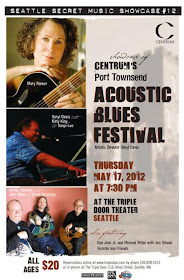
Picture by Alan White http://www.earlyblues.com/
I sent this more than two years ago. I will send it again. Maybe YOU can, too-- or cut and paste mine, add your own sentiments, and send it. It's an idea that should happen. Medal of Freedom is perfect-- after all: Who delivered us from the days of old?
President Barack Obama
The White House
1600 Pennsylvania Avenue N.W.
Washington, D.C. 20500
May 29, 2012
Re: Charles Edward “Chuck” Berry
Presidential Medal of Freedom
Dear President Obama,
You have a full plate. Not much of it looks fun. But here’s an easy decision for you.
I’m asking that you honor Chuck Berry with the Presidential Medal of Freedom.
Chuck Berry is often called one of the architects of rock and roll music. He’s credited with nearly inventing rock and roll guitar. He is often called the first poet of rock and roll. He’s a first class showman who continues to play at age 85.
The songs he wrote are the basis of rock and roll: Maybellene, Nadine, Rock and Roll Music, Roll Over Beethoven, Brown Eyed Handsome Man, School Day (Ring Ring Goes the Bell), Johnny B. Goode, No Particular Place to Go—and that’s just for starters.
His music helped change the world. When Chuck Berry and his contemporaries first started playing big shows, a rope separated black from white—but as the music caught fire, the rope fell down, and kids mixed and mingled, dancing together despite segregation.
Chuck Berry built his success the old fashioned way—he worked for it, putting on thousands of shows, in hundreds of towns and cities around the world. He often travelled alone, carrying his guitar and an overnight bag, teaching his songs to the backup group in a matter of minutes just prior to the show.
In the segregated south Berry sometimes slept in his car, and often cooked his own food on a portable hot plate rather than knock on the back door of a restaurant.
When Chuck Berry’s first single, “Maybellene,” was released, in 1955, the record included two “co-authors” who had no part in writing the song. Berry fought hard to get the rights restored to his name. He managed much of his own career.
He has made mistakes. So has our country. In the late 1950s, at the height his success, Chuck Berry was arrested and tried three times on trumped up charges that he violated the Mann Act. The first conviction was overturned because of the blatant racism of the trial judge. The second trial ended in acquittal. The third time was the charm for the prosecution—and just after releasing “Johnny B. Goode,” Berry spent two years in prison.
He didn’t waste his time there. He studied business and typing. He practiced. He wrote songs. And when he was released, he hit the ground running, putting on shows wherever his parole officer allowed, and releasing new classics such as “Nadine,” “Promised Land,” You Never Can Tell” and “No Particular Place to Go.”
His music was the foundation of the so-called “British Invasion” of the early 1960s. Ex Beatle John Lennon once said that “If you tried to give rock and roll another name, you might call it 'Chuck Berry'." Stevie Wonder said "There's only one true king of rock 'n' roll. His name is Chuck Berry."
He Performed for President Jimmy Carter at the White House in 1975.
In 1977, his song “Johnny B. Goode” was launched into outer space on Voyager 1. (In one Saturday Night Live episode, Father Guido Sarducci announced that the first message from extraterrestrials had been received. Once decoded, the message stated, "Send more Chuck Berry!")
In 1986 he was among the very first inducted into the Rock and Roll Hall of Fame.
In 1987 he published his Autobiography, writing every word of it himself.
In the year 2000, he was honored by the President at Kennedy Center.
At age 85, Chuck Berry continues to tour and perform. Once a month he puts on a show at a St. Louis bar and restaurant called Blueberry Hill. (He just did his 175th Blueberry Hill show!) These hometown shows have become legendary, drawing fans from around the country and around the world to see one of America’s musical legends perform among friends in a small room. His backup group is something of a family affair, with longtime friends and with his own son and daughter helping out with guitar, harmonica and vocals. If he’s feeling inspired, Mr. Berry even performs his famous “scoot” or “duck walk.”
Mr. President—most of what you do for us is hard. You’ve said that if a decision is easy, someone else makes it before it gets to your desk.
Well, here’s an exception to that rule.
This decision is yours alone. It's an easy one. And it’s a great one.
As Chuck Berry turns 85 this year, “deliver us from the days of old,” and honor him and his work with the Medal of Freedom.
Thank you.
Sincerely,
PETER O’NEIL










